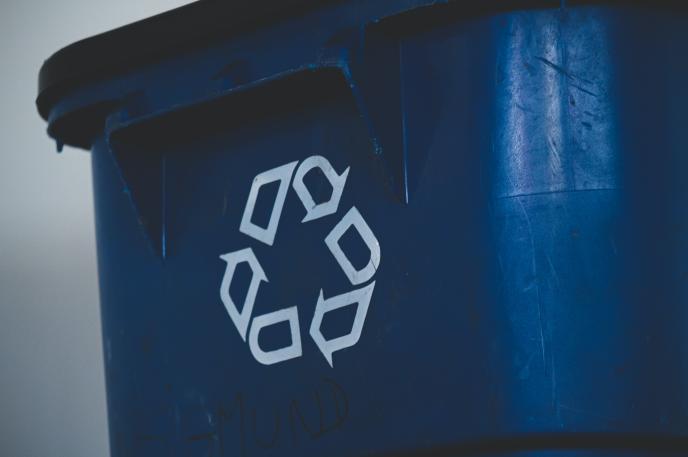
Learn to recycle right with Charlotte Mecklenburg Library and Mecklenburg County.
April 19, 2021
Mecklenburg County 7 Recycling FAQs & Answers
On May 11, Charlotte Mecklenburg Library will host a FREE webinar to teach our patrons ages 12+ how to Recycle Right! Advanced registration is required to receive the participation link. Recycling resources will be shared with registrants before and after the program.
Library staff is organizing the event with two residential recycling educators. In preparation for the event we asked the public educators what they most need residents to understand. They didn’t hesitate to explain how materials need to be prepared correctly to be efficiently sorted at the recycling center. Here are their two critical requests:
- Do not bag recyclables! Plastic bags cause tremendous operational and financial challenges for our processing facility. No flexible plastic wraps, films, bags or packaging should ever be put in the recycling cart.
- Recyclables must be loose, clean, dry and empty! Recyclable items must be placed individually in the recycling cart, not in bags, for the separation equipment to function properly. Never put one type of recyclable inside of another (i.e. aluminum cans in a cardboard box.) All recyclables must be non-contaminated. This means every individual item must be clean, dry and empty, with no residue of the original contents (i.e. food.)
Following are the questions solid waste staff receive weekly*:
*Please note these are the recycling guidelines for Mecklenburg County, requirements may differ slightly in other counties.
- What plastic items can I put in my residential curbside cart?
ONLY plastic bottles and jugs, with a pourable neck or spout that is smaller at the top than the base, are accepted. These are the only pure plastic types that we can sell on the recyclable materials commodity market. Labels do not need to be removed.
Examples include: Water and soda bottles of any colors, milk or juice jugs, laundry jugs, shampoo or lotion bottles (pumps should be removed and trashed first.)
Please note the following common household plastics are not accepted in Curbside Recycling:
Plastic bags/bubble wrap, produce clamshells, yogurt cups, dairy tubs, takeout food containers, styrofoam, zip pouches, vitamin and medication bottles, disposable utensils and plastic cups, buckets, storage containers, hoses.
- What recycling symbol numbers (1, 2, 5, 7 etc.) are accepted locally?
None. See question FAQ #1 above listing the only plastics that are acceptable.
The RICs (resin identification codes) listed inside the chasing arrows triangle on the bottom of plastic packaging are, unfortunately, no longer reliable. Therefore, we do not use them anymore.
- What do I do with lids and caps?
Never place loose lids or caps in the recycling cart. Loose lids and caps are small and fall through our machines and end up contaminating the glass that is collected. Glass mixed with plastic and metal caps (among other things) cannot be sold to processors as raw materials as it is considered contaminated – so keep the plastic caps on the bottles.
It is “ok” to leave securely attached plastic caps and lids on clean, dry and empty cartons, bottles, jugs and jars. Never try to recycle caps by themselves.
- How much grease is tolerated to recycle pizza boxes?
Somewhere between a smidge and a tad; Yes that is an intentionally vague answer! Of course we prefer to only accept clean and dry cardboard to only process and sell by the ton the highest quality recyclables. We definitely do not want whole pieces of pizza or crust left in the box (yes it happens!) Cheese, sauce and crumbs are also contaminants. If ½ your box is clean, rip that part off to recycle and please trash anything with food or grease residue.
- Are aluminum foil and pans (pie, lasagna, roasting) recyclable?
No. Our machines can only recognize and sort aluminum cans. Additionally, more often than not these common aluminum food storage items are contaminated with food. Remember we do not want food residue on anything.
- How do I dispose of household batteries?
Rechargeable batteries must be disposed of properly because they contain hazardous elements such as lithium, nickel, and metal hydrides. Never place rechargeable batteries in your trash or recycling carts as they are the number one cause of fires at our facilities. Please take rechargeable batteries to the household hazardous waste station at one of our full service drop off centers.
Traditional alkaline batteries can be put in the trash to be sent to the landfill, because they do not contain any hazardous elements.
- What types of glass can be recycled?
Similar to plastics (see FAQ #1), only glass bottles and jars typically used in your kitchen or bathroom are accepted. All colors of glass are accepted. Caps and lids can remain on, if securely attached, (see FAQ #3). Labels do not need to be removed.
We prefer separated glass be brought to our full service drop off centers and deposited into the large yellow dumpsters marked, “Clean Glass Only.”
Please note the following common household glass items are not accepted:
Dishes and glasses, pyrex/corning ware, vases, bulbs, picture frames, windows, aquariums, ceramics, porcelain, crystal.
To learn more and have all of your questions answered live, please register for an upcoming Recycle Right presentation. If you still have questions, email [email protected] or visit wipeoutwaste.com.
--
This blog was written by Maitri Meyer, residential waste reduction educator for Mecklenburg County.
